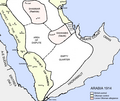The Saudi Arabia Portal – بوابة المملكة العربية السعودية
Saudi Arabia, officially the Kingdom of Saudi Arabia (KSA), is a country in West Asia and the Middle East. It covers the bulk of the Arabian Peninsula and has a land area of about 2150000 km2 (830000 sq mi), making it the fifth-largest country in Asia and the largest in the Middle East. It is bordered by the Red Sea to the west; Jordan, Iraq, and Kuwait to the north; the Persian Gulf, Bahrain, Qatar and the United Arab Emirates to the east; Oman to the southeast; and Yemen to the south. The Gulf of Aqaba in the northwest separates Saudi Arabia from Egypt and Israel. Saudi Arabia is the only country with a coastline along both the Red Sea and the Persian Gulf, and most of its terrain consists of arid desert, lowland, steppe, and mountains. The capital and largest city is Riyadh; other major cities include Jeddah and the two holiest cities in Islam, Mecca and Medina. With a population of 32.2 million, Saudi Arabia is the fourth most populous country in the Arab world. (Full article...) Selected article -The COVID-19 pandemic in Saudi Arabia is part of the worldwide pandemic of coronavirus disease 2019 (COVID-19) caused by severe acute respiratory syndrome coronavirus 2 (SARS-CoV-2). The first case in the kingdom was confirmed by the Ministry of Health on 2 March 2020 and in the following months, the kingdom held the highest number of confirmed cases in the Arab states of the Persian Gulf. The kingdom announced the suspension of all domestic and international travel on March 21; domestic travel was reinitiated on May 21. After curfews and lockdowns were placed on several administrative levels, the number of daily confirmed cases shrunk dramatically and by June 21, all curfews were lifted through a three-phase program enacted throughout the country, except the city of Mecca. By mid-July, the kingdom was seeing more daily recoveries than cases. The Hajj took place with only 10,000 socially-distanced pilgrims allowed to take part in the annual pilgrimage, which fell during the last week of July and the first week of August. (Full article...)Did you know (auto-generated)
News
Related portalsReligions in Saudi Arabia Arab states Other countries WikiProjectsThings you can do
This is a Good article, an article that meets a core set of high editorial standards.
The legal system of Saudi Arabia is based on Sharia, Islamic law derived from the Quran and the Sunnah (the traditions) of the Islamic prophet Muhammad. The sources of Sharia also include Islamic scholarly consensus developed after Muhammad's death. Its interpretation by judges in Saudi Arabia is influenced by the medieval texts of the literalist Hanbali school of Fiqh. Uniquely in the Muslim world, Sharia has been adopted by Saudi Arabia in an uncodified form. This, and the lack of judicial precedent, has resulted in considerable uncertainty in the scope and content of the country's laws. The government therefore announced its intention to codify Sharia in 2010, and, in 2018, a sourcebook of legal principles and precedents was published by the Saudi government. Sharia has also been supplemented by regulations issued by royal decree covering modern issues such as intellectual property and corporate law. Nevertheless, Sharia remains the primary source of law, especially in areas such as criminal, family, commercial and contract law, and the Qur'an and the Sunnah are declared to be the country's constitution. In the areas of land and energy law the extensive proprietorial rights of the Saudi state (in effect, the Saudi royal family) constitute a significant feature. The current Saudi court system was created by King Abdul Aziz, who founded the Kingdom of Saudi Arabia in 1932, and was introduced to the country in stages between 1927 and 1960. It comprises general and summary Sharia courts, with some administrative tribunals to deal with disputes on specific modern regulations. Trials in Saudi Arabia are bench trials. Courts in Saudi Arabia observe few formalities and the country's first criminal procedure code, issued in 2001, has been largely ignored. King Abdullah, in 2007, introduced a number of significant judicial reforms, although they are yet to be fully implemented. (Full article...)Selected pictureMore did you know
General imagesThe following are images from various Saudi Arabia-related articles on Wikipedia.
Featured contentFeatured articlesGood articles
Associated WikimediaThe following Wikimedia Foundation sister projects provide more on this subject:
Sources
Discover Wikipedia using portals | ||||






![Image 2A view of Jabal Sawda, a peak located in Saudi Arabia, with an elevation of around 3,000 metres (9,843 ft).[1]](http://upload.wikimedia.org/wikipedia/commons/thumb/5/59/Al_Sawda_peak.jpg/120px-Al_Sawda_peak.jpg)





















































